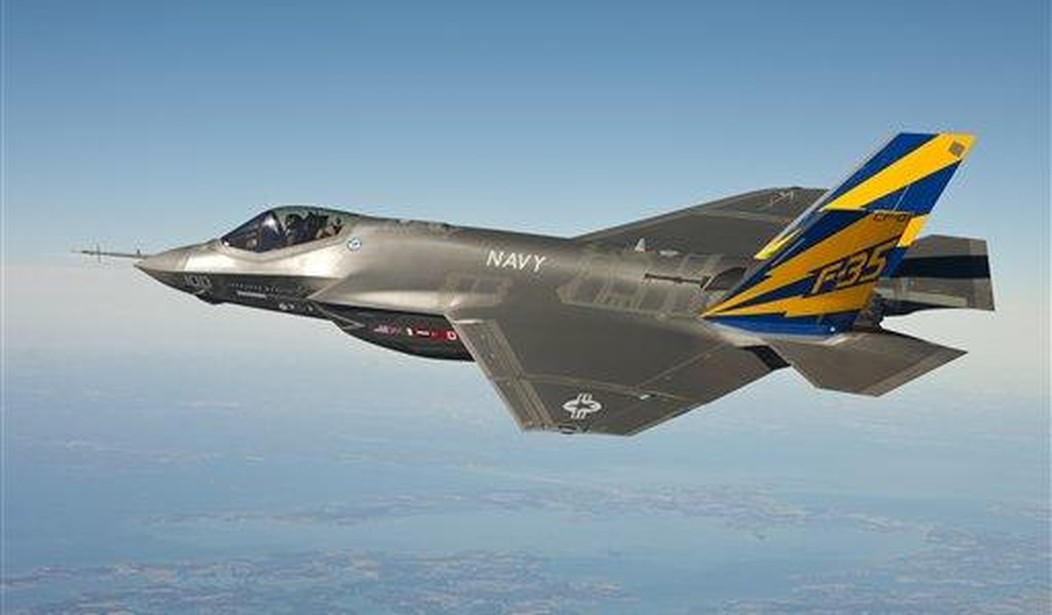Few entities have the innate ability to waste money as effectively as the U.S. government. It is as though we have people in Washington D.C. who spend their time coming up with new and creative ways to squander billions. A perfect example is the push by some to come up with a whole new engine for the F-35.
The F-35 Joint Strike Fighter is our most advanced fighter jet, designed to go up against the best that our potential adversaries may have. It had been developed with, and is used by, several of our allies, including the UK, Australia, and Israel. Its engine, the Pratt and Whitney F135, is an engineering marvel, allowing the F-35 to perform in ways no aircraft ever has. Time and changing mission parameters, naturally, have periodically required that upgrades be made. The engine’s manufacturer has an upgrade package that can, relatively easily and inexpensively, be applied to the existing engine to meet the new requirements.
But instead, some in the Biden administration have resurrected an ill-conceived idea from late in the Obama administration to chuck the engine altogether and come up with a whole new powerplant. They call it the Adaptive Engine Transition Program (AETP), and it will cost billions of taxpayer dollars more to implement, while further jeopardizing our military readiness. Only in Washington D.C. would such a comprehensively detrimental idea be seriously considered.
It is an expensive proposition to design, develop, and replace a whole new powerplant in a billion-dollar aircraft, especially when a plan exists to upgrade the existing one to meet new mission requirements. Besides the cost of developing the new engine from scratch, the American military procurement process is a long, laborious, and expensive one. This new engine will require months of testing before the first one is ever installed on an airplane.
Recommended
The F-35 program, true to Pentagon form, was already plagued with production delays and cost overruns in its earlier stages. A GAO report from July 2021 found that the program was more than eight years behind schedule and $165 billion over budget. Swapping out the engine now will set it back even further and add more billions to that figure.
An entirely new engine also means an entirely new supply chain to source production and parts for it. Everyone is aware of the current supply chain issues and backlogs our nation is experiencing. In fact, Lockheed Martin spokeswoman Laura Siebert recently told Defense News that finding savings in the supply chain process will be key to keeping costs down. There is an existing infrastructure in place to support the current engine; why would we put ourselves in a position to have to establish a whole new one when even maintaining current supply chains is such a challenge? Not only that, but given the cost this will be only a U.S. Air Force project – the Navy, Marines, and our allies cannot afford such a gamble, meaning that there will now be two different engines out there, with two separate supply chains. Part of the appeal of the F-35 was its interoperability. Having a bunch with different engines and different parts tosses that concept out the window.
It’s also not simply a matter of taking our existing F-35’s and changing out an engine like a pit crew changes tires. Replacing an important component like the power plant will take several of our best fighter aircraft offline for an indeterminate amount of time, at a time when we arguably need them the most. The Heritage Foundation recently released a report showing that our nation’s military readiness is already severely degraded, especially that of the Air Force and Navy. Fielding fewer of our most advanced aerial weapon system will only make that gap worse.
Furthermore, the Defense Department is not immune to the laws of economics – if you want to pursue an expensive endeavor like needlessly building a new engine, there will be a trade-off, and that trade-off will most likely equate to fewer actual aircraft. The Pentagon, in preparation for the upcoming vote on the National Defense Authorization Act (NDAA) recently found that it is already $1.4 billion short of funds for the next major contract to buy F-35 fighter jets. Adding the cost of the AETP on top of an existing funding shortfall would mean that even fewer aircraft will be available. This would also mean that the positive economic impact of housing more F-35s at military bases across the country will be blunted.
Brig. Gen. Dale White, the Air Force’s Executive Officer for fighters and advanced aircraft, said in a press conference last August that “trying to change a powerplant in… a fielded system is extremely complex… You have to think about what the return on investment might be.” It is important that we spend an adequate amount on our military; but it is even more important that we spend it wisely. Wasting scarce taxpayer dollars on pet schemes like a new F-35 engine is not only fiscally irresponsible, but further compromises our national security.
Eli Bremer is a USAF Academy graduate and former USAF officer specializing in acquisitions and contracting. He was a candidate for U.S. Senate earlier this year, and represented the United States in the 2008 summer Olympic Games in the pentathlon event.

























Join the conversation as a VIP Member